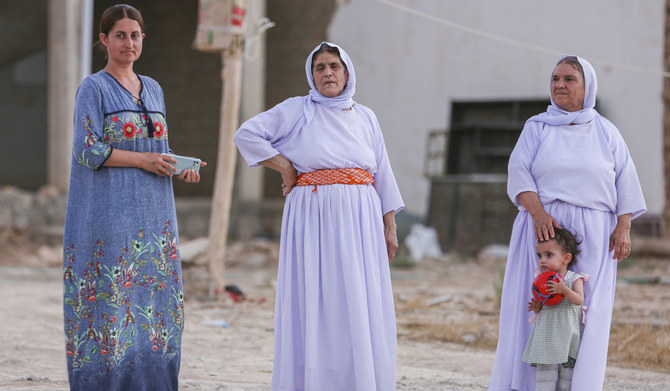SINJAR, Iraq: Fahad Qassim was just 11 years old when Daesh militants overran his Yazidi community in the Sinjar region of northern Iraq in August 2014, taking him captive.
The attack was the start of what became the systematic slaughter, enslavement, and rape of thousands of Yazidis, shocking the world and displacing most of the 550,000-strong ancient religious minority. Thousands of people were rounded up and killed during the initial assault, which began in the early hours of Aug. 3.
Many more are believed to have died in captivity. Survivors fled up the slopes of Mount Sinjar, where some were trapped for many weeks by a Daesh siege.
The assault on the Yazidis — an ancient religious minority in eastern Syria and northwest Iraq that draws from Zoroastrian, Christian, Manichean, Jewish and Muslim beliefs — was part of the militant Daesh’s effort to establish a caliphate.
At one stage, the group held a third of Iraq and neighboring Syria before being pushed back by US-backed forces and Iran-backed militias and collapsing in 2019.
Now 21, Qassim lives in a small apartment on the edge of a refugee camp in the Kurdistan region of Iraq, far from his hometown.
He was trained as a child soldier and fought in grinding battles before being liberated as Daesh collapsed in Syria’s Bagjhuz in 2019, but only after losing the bottom half of his leg to an airstrike by the US-led forces.
“I don’t plan for any future in Iraq,” he said, waiting for news on a visa application to a Western country.
“Those who go back say they fear the same thing that happened in 2014 will happen again.”
Qassim’s reluctance to return is shared by many. A decade after what has been recognized as a genocide by many governments and UN agencies, Sinjar district remains largely destroyed.
The old city of Sinjar is a confused heap of grey and brown stone, while villages like Kojo, where hundreds were killed, are crumbling ghost towns.
Limited services, poor electricity and water supply, and what locals say is inadequate government compensation for rebuilding have made resettlement challenging.
POWER STRUGGLE
The security situation further complicates matters. A mosaic of armed groups that fought to free Sinjar have remained in this strategic corner of Iraq, holding de facto power on the ground.
This is despite the 2020 Sinjar Agreement that called for such groups to leave and for the appointment of a mayor with a police force composed of locals.
And from the skies above, frequent Turkish drone strikes target fighters aligned with the Kurdistan Workers Party (PKK) that is outlawed by Turkiye. Civilians are among those killed in these attacks, adding to the sense of insecurity.
Akhtin Intiqam, a 25-year-old commander in the PKK-aligned Sinjar Protection Units (YBS), one of the armed factions in the area, defends their continued presence:
“We are in control of this area and we are responsible for protecting Sinjar from all external attacks,” she said.
Speaking in a room adorned with pictures of fallen comrades, numbering more than 150, Intiqam views the Sinjar Agreement with suspicion.
“We will fight with all our power against anyone who tries to implement this plan. It will never succeed,” she said.
GOVERNMENT EFFORTS
As the stalemate continues, Sinjar remains underdeveloped. Families who do return receive a one-time payment of about $3,000 from the government.
Meanwhile, more than 200,000 Yazidis remain in Kurdistan, many living in shabby tent settlements. The Iraqi government is pushing to break up these camps, insisting it’s time for people to go home.
“You can’t blame people for having lost hope. The scale of the damage and displacement is very big and for many years extremely little was done to address it,” said Khalaf Sinjari, the Iraqi prime minister’s adviser for Yazidi affairs.
This government, he said, was taking Sinjar seriously.
It plans to spend hundreds of millions of dollars – including all previously unspent budgets since 2014 — on development and infrastructure, including for paying compensation, building two new hospitals and a university and linking Sinjar to the country’s water network for the first time. “There is hope to bring back life,” said Sinjari, himself a member of the Yazidi community.
However, the presence of an estimated 50,000 Daesh fighters and their families across the border in Syria in detention centers and camps stokes fears of history repeating itself.
Efforts by some Iraqi lawmakers to pass a general amnesty law that could see the freeing of many Daesh prisoners from Iraqi jails only add to these concerns. And the Yazidi struggle for justice is stalled, with the government this year ending a UN mission that sought to help bring Daesh fighters to trial for international crimes, citing a lack of cooperation between it and the mission.
Despite the challenges, some Yazidis are choosing to return. Farhad Barakat Ali, a Yazidi activist and journalist who was displaced by Daesh, made the decision to go back several years ago.
“I’m not encouraging everyone to return to Sinjar, but I am also not encouraging them to stay at the IDP camps either,” he said from his home in Sinjar city, in the stifling heat of a power cut.
“Having your hometown — living in your hometown — is something that people can be proud of.”
















